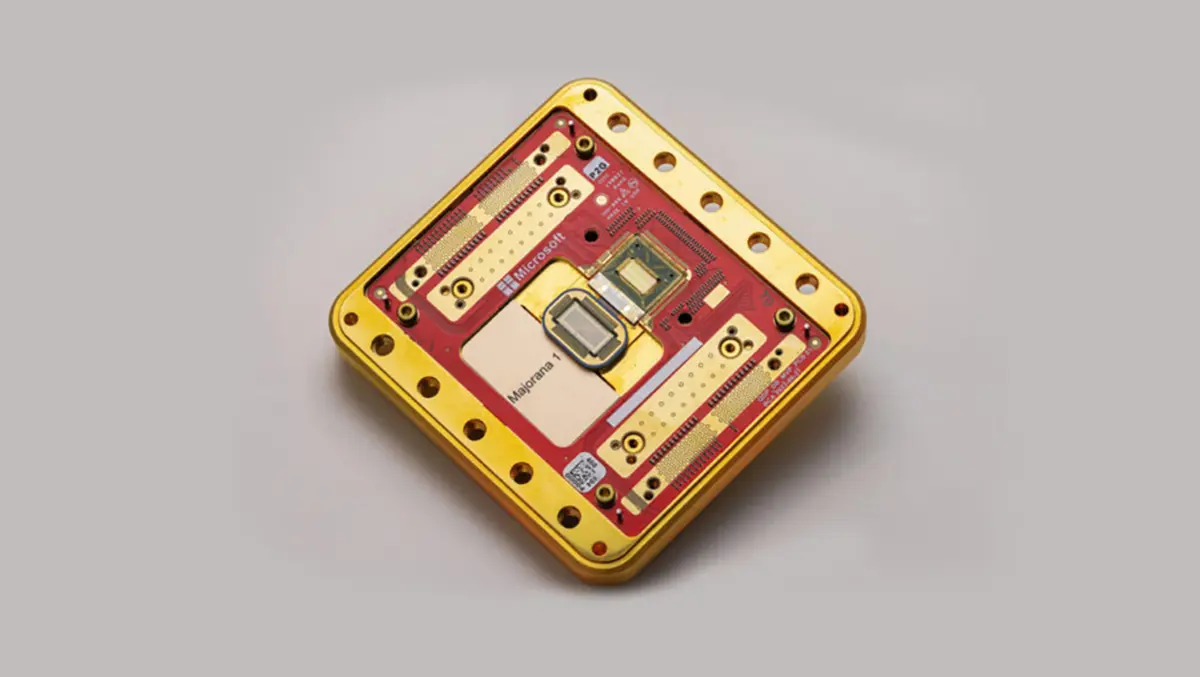
Microsoft unveils Majorana 1 in quantum computing leap
Microsoft has introduced Majorana 1, the first quantum chip powered by its new Topological Core architecture, which the company says will enable quantum computers capable of solving industrial-scale problems in years rather than decades.
The chip leverages a novel material known as a topoconductor, which allows for the observation and control of Majorana particles, providing more reliable and scalable qubits—the fundamental building blocks of quantum computing.
"We took a step back and said 'OK, let's invent the transistor for the quantum age. What properties does it need to have?'" said Chetan Nayak, Microsoft technical fellow. "And that's really how we got here – it's the particular combination, the quality and the important details in our new materials stack that have enabled a new kind of qubit and ultimately our entire architecture."
The new chip architecture offers a clear path to fitting a million qubits on a single chip, a crucial threshold for quantum computers to tackle complex industrial and societal challenges. Microsoft said such a quantum system could be used to break down microplastics into harmless byproducts or create self-healing materials for construction, manufacturing, and healthcare.
"Whatever you're doing in the quantum space needs to have a path to a million qubits. If it doesn't, you're going to hit a wall before you get to the scale at which you can solve the really important problems that motivate us," Nayak said. "We have actually worked out a path to a million."
A topoconductor, or topological superconductor, creates a new state of matter that is neither a solid, liquid nor gas but instead exists in a topological state. This enables the development of a more stable, fast, and digitally controlled qubit without the limitations of current approaches. A paper published in Nature details how Microsoft researchers have been able to create and accurately measure the quantum properties of topological qubits—an essential step toward practical computing.
"This breakthrough required developing an entirely new materials stack made of indium arsenide and aluminium, much of which Microsoft designed and fabricated atom by atom," the company said.
Microsoft claims the Topological Core powering Majorana 1 is reliable by design, incorporating error resistance at the hardware level for greater stability. Commercially relevant applications will require trillions of operations across a million qubits, which would be impractical with current analogue-based control methods. Microsoft's new digital measurement approach allows for simplified qubit control, redefining how quantum computing functions.
Matthias Troyer, Microsoft technical fellow, said the company's long-term approach to quantum computing focused on practical application rather than theoretical advancement.
"From the start, we wanted to make a quantum computer for commercial impact, not just thought leadership," Troyer said. "We knew we needed a new qubit. We knew we had to scale."
This approach led Microsoft to be included in the US Defense Advanced Research Projects Agency's (DARPA) Underexplored Systems for Utility-Scale Quantum Computing (US2QC) programme. Microsoft is one of two companies invited to the final phase of the initiative, which aims to develop the industry's first utility-scale fault-tolerant quantum computer.
Beyond its own hardware, Microsoft has also partnered with Quantinuum and Atom Computing to drive scientific breakthroughs with existing quantum technologies. The company's Azure Quantum platform integrates AI, high-performance computing, and quantum systems to help customers advance scientific discovery.
Microsoft said the next major breakthrough in quantum computing requires a machine capable of handling a million qubits and performing trillions of reliable operations. According to the company, this milestone is now within reach.
Because quantum computers can mathematically model nature with extreme precision, they could solve complex problems in chemistry, materials science, and other industries that classical computers cannot. This could include designing self-healing materials, developing catalysts for breaking down pollutants, or harnessing enzymes for healthcare and agriculture applications.
Quantum computing's ability to perform precise calculations could allow for the design of materials, pharmaceuticals, and industrial products with unprecedented efficiency.
"Any company that makes anything could just design it perfectly the first time out. It would just give you the answer," Troyer said. "The quantum computer teaches the AI the language of nature so the AI can just tell you the recipe for what you want to make."
Microsoft's approach to quantum computing began nearly two decades ago when it decided to pursue topological qubits. Unlike traditional qubits, topological qubits offer greater stability and require less error correction, making them more scalable. However, the challenge lay in creating the exotic Majorana particles needed for the process, as they do not exist in nature and must be generated under specific conditions.
The Nature paper confirms that Microsoft has not only succeeded in creating Majorana particles but also developed a precise measurement method using microwaves. This breakthrough allows Microsoft's quantum systems to measure qubits with extreme accuracy, detecting differences as small as a single electron among a billion.
Majorana 1 integrates both qubits and control electronics into a single compact chip that can fit inside Microsoft's Azure datacentres. Unlike alternative qubit technologies that require large-scale infrastructure, Microsoft's approach ensures a more practical and scalable quantum computing solution.
"It's one thing to discover a new state of matter," Nayak said. "It's another to take advantage of it to rethink quantum computing at scale."


